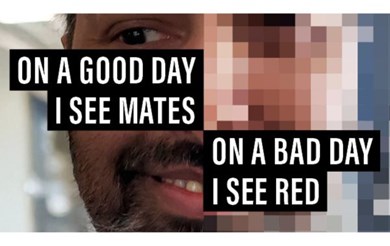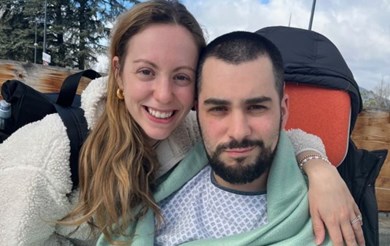Post-concussion syndrome (PCS) is a condition in which the symptoms of concussion last for longer than a few weeks. Symptoms of PCS include headaches, fatigue, changes in vision and problems with balance and dizziness, among others.
A team of clinicians at Chelsea and Westminster Hospital are working towards pro-actively identifying PCS in patients with head injuries in the emergency department. Here, we talk with occupational therapist Tiffany Lin and physiotherapist Jordan Lewis to find out more about their new initiative.
Hi Tiffany & Jordan! Can you start by telling us a bit about yourselves and your roles?
Hello, everyone. We are Tiffany Lin, lead occupational therapist, and Jordan Lewis, lead physiotherapist. We both are working in the emergency department and acute medicine unit at the Chelsea and Westminster Hospital.
Tell us about your project.
Each year, around 1.4 million people in England and Wales visit emergency departments (ED) for head injuries. While most cases are minor, there is growing concern over mild traumatic brain injury, which can lead to long-term issues like chronic symptoms and disabilities, prompting a shift toward more proactive, early intervention. Recent guidelines emphasize the importance of follow-up care, particularly from primary care providers and specialists, to improve recovery and prevent poor outcomes.
As we know, there’s currently a gap in practice when it comes to treating mild head injuries, which has led to inconsistent care and follow-up. To address this, a new initiative was developed by a multidisciplinary team, led by two emergency department consultants, Dr. Kai Koch and Dr. Claire Emerson.
This initiative started with a pilot pathway, which ran from October 2024 to December 2024. During this time, we closely monitored the process of mild head injury treatment and care and collected data. Based on this information, we identified areas for improvement, particularly around the referral and post ED visit follow up process. As a result, an official pathway was launched in January 2025 and is still in operation today.
How do you think this project will help people with head injuries?
This head injury service supports patients by providing follow-up telephone calls 72 hours after discharge from the ED. These calls allow for early intervention, ensuring deteriorations or concerns are identified quickly. The service offers personalised support, addressing physical, cognitive, sleep and emotional needs. This helps to bridge the gap between acute care and community rehabilitation, making onward referrals when necessary. It also provides valuable support for families and caregivers, which we hope improves recovery and quality of life for our patients.
What do you hope to happen next?
Next, we hope to implement a more streamlined mild head injury pathway in our department, ensuring that all patients who attend the ED receive timely, high-quality, and comprehensive care. By focusing on early intervention, we aim to reduce the long-term effects of mild head injuries and provide better outcomes for patients.
A key part of this plan is to establish a concussion clinic where a multidisciplinary team can consistently support patients, especially those struggling with post-concussion syndrome (PCS). This clinic will focus on helping patients return to their daily activities and life roles, ultimately enhancing their overall quality of life.
Eventually, we wish to use the data collected from our service to pursue publication opportunities and present at various conferences. By sharing our approach, we hope to foster greater collaboration with other NHS trusts and international organisations, ultimately improving the standard of care for mild head injury patients across the board. We envision that these efforts will not only lead to better patient outcomes within our department but also help influence broader practices and care standards for mild head injury management on a wider scale.
Who can currently get involved, and how can they find out more?
We are open to further discussion and collaboration with other NHS trusts or charities/institutions with a special interest in this area. They can contact us directly via email for further discussion. Our contact details are tiffany.lin@nhs.net and j.lewis16@nhs.net.
Back











